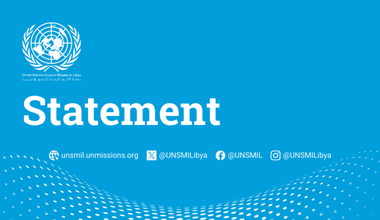Libyans have an Opportunity to Include Human Rights in Constitution
Ali Elakermi has earned for himself the label of Libya’s second longest-serving prisoner of opinion, having spent about 30 years in Gadhafi regime prisons. Nearly three years after the 2011 revolution that toppled the dictatorship, Elakermi is a determined human rights campaigner who bluntly says more efforts are needed for human rights to take hold in the new Libya.
He, many other human rights advocates like him and Libyans in general have their opportunity to make their voice heard when Libya drafts a new constitution.
On 18 December 2013, Elakermi sat proudly in the rows listening to speeches during a forum in Tripoli under the theme “Human Rights in Constitutions” organized by the Human Rights Committee of the General National Congress, Libya’s first elected body in over 40 years, and the Human Rights, Transitional Justice and Rule of Law Division of the United Nations Support Mission in Libya (UNSMIL).
“We hope human rights be part of the preamble to the Constitution, written and fortified,” Elakrami says in an interview. But the former political prisoner, currently human rights advisor to the President of the GNC, cautioned that what matters is implementation.
“Practice requires an environment, awareness and great deal of service,” says Elakrami, who also heads the Libyan Association for the Prisoners of Opinion. “It is a matter of spreading awareness, how to reach out to people and develop new concepts.”
As part of its transition to democracy, Libya plans to draft a new constitution. No date has been set yet for the election of a 60-member Constitution-Drafting Assembly. However, it is expected to take place sometime in the first trimester of 2014. The process has been delayed by logistical obstacles and lack of strong popular enthusiasm for the balloting. Still, by 20 December 2013, about half a million voters have registered. The High National Elections Commission has extended the period for registration of voters until 31 December 2013.
The task of the assembly, which is to equally represent the Eastern, Western and Southern regions of Libya, is to write the constitution after consultations with various society components. Then the constitution will be put to popular referendum for approval.
In line with its mandate, UNSMIL is providing technical assistance and advice to the Libyan electoral authorities. The Mission also is assisting in the dialogue among the various Libyan political forces and in reforming the judiciary and public security.
Speaking at the 18 December forum, Special Representative for the Secretary-General for Libya Tarek Mitri, said the constitution opens an opportunity for Libyans to lay solid foundations for a modern Libyan state that respects human rights, establishes the rule of law and achieves national reconciliation through truth and accountability.
He welcomed as important steps since the revolution the GNC’s adoption of the Transitional Justice Law, which followed the enactment of the Law on the Criminalization of Torture, Forced Disappearance and Discrimination, and offered continued UN technical support for their implementation.
“In this new constitution we see the picture of the new Libya. However, such picture will not be complete until human rights are upheld and their respect is guaranteed in all aspects of the national life. The inclusion of human rights clauses in the new constitution may well constitute one of the corner stones of the new Libyan State,” Mr. Mitri added.
Also addressing the forum, First Vice President of the GNC Ezzedine Al-Awamy said “people are born free and should be equal in their rights and freedom.” He added that governments and political leaders “are obliged to ensure these rights without discrimination.”
For Elakrami, the forum – and the debate over constitution – is a far cry from where he was four decades ago – when Gadhafi’s security agents threw him in jail where he spent 30 years.
He was in and out of prison on a charge of belonging to a political party, and finally was sentenced to life but was released in 2002 as the regime tried to improve its international image.
He now heads the Libyan Association for the Prisoners of Opinion, which comprises thousands of political prisoners. Elakrami points out that 21 members of the GNC are former political prisoners.
“Moral values have been destroyed. We are building a new experience,” he says. “We hope the international organizations assist us in this mission of planting the values of human rights.”
The gray-haired bearded 63-year-old jokingly likes to say he is 11 years old – counting from the time he was released from prison. He also smiles as he points out that he is 60 years his daughter’s senior.
Elakrami supports reconciliation and he and the association make it a point to visit their former jailers in prison and wish for them a fair trial. But he expressed his dissatisfaction with the human rights situation in post-revolution Libya.
“We are against violations, against the kidnappings, bypassing the law and extrajudicial trials. We need to propose the principle of reconciliation. There are certain crimes that cannot be overcome but it should be dealt with through the State of law and institutions,” Elakrami said.
“We want our children to live comfortably,” he says.
--------------------------------------
Article by:
Samir F. Ghattas
UNSMIL Public Information and Communication Office
 United Nations Peacekeeping
United Nations Peacekeeping UN
UN











